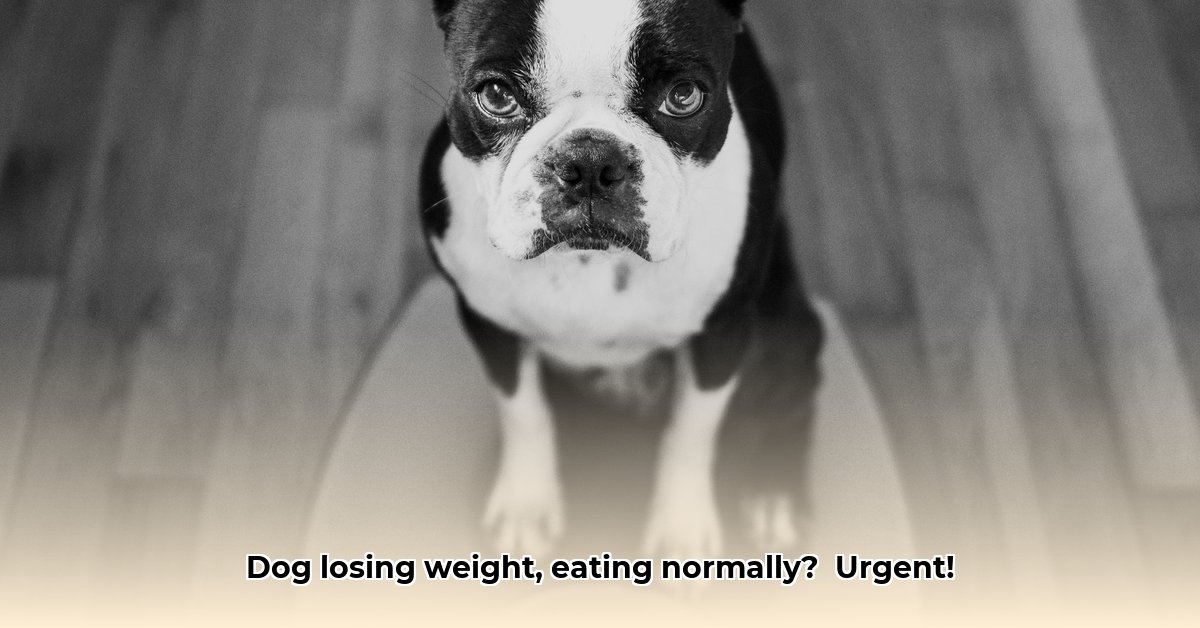
Seeing your dog lose weight despite eating normally is alarming. This isn't just about aesthetics; it often signals an underlying health problem requiring immediate veterinary attention. This guide provides actionable steps to help you understand and address this concerning issue.
Understanding Unexplained Weight Loss in Dogs
Noticing your dog slimming down, even with a hearty appetite, is understandably frightening. It's crucial to act swiftly. This isn't something to dismiss; early intervention significantly improves the chances of a positive outcome.
Potential Causes of Weight Loss with Normal Appetite
Several factors can contribute to weight loss in dogs, even when their food intake appears normal. Here are some key possibilities:
Underlying Medical Conditions: Many illnesses disrupt your dog's body's ability to process nutrients, resulting in weight loss despite adequate food intake. Examples include diabetes (difficulty utilizing sugar for energy), hypothyroidism (slowed metabolism), kidney disease, various cancers, and inflammatory bowel disease (IBD).
Internal Parasites: Parasites like worms and fleas siphon nutrients, leading to weight loss. Regular parasite prevention is crucial.
Dental Issues: Painful teeth or gums can discourage eating, even if your dog seems interested in food. This can severely restrict nutrient uptake.
Increased Metabolism: In rarer cases, a faster-than-normal metabolism might lead to weight loss despite adequate calorie intake. Certain metabolic disorders increase metabolic rate.
Stress and Anxiety: Emotional factors can impact appetite and cause weight loss. Major life changes for your dog, like a new pet or move, can cause significant stress.
Diagnostic Steps: Your Vet's Crucial Role
A veterinary examination is paramount. Don't delay; timely diagnosis is essential. Your vet will likely conduct the following:
Step 1: Comprehensive History: Provide detailed information about your dog's diet, activity level, recent changes in routine, and any other symptoms (vomiting, diarrhea, lethargy). The more information, the better.
Step 2: Thorough Physical Exam: Your vet will carefully examine your dog for any abnormalities.
Step 3: Blood Work: Blood tests assess organ function and help detect conditions like diabetes, kidney disease, and other issues.
Step 4: Urinalysis: Urine analysis further investigates kidney function and other potential problems.
Step 5: Stool Sample Analysis: This screens for parasites, offering vital insights into your dog's digestive health.
Treatment and Ongoing Care
Treatment hinges on the identified cause. Your vet will create a personalized plan, possibly including:
Medication: For underlying conditions, medication may be necessary. Strictly follow your vet's instructions.
Dietary Changes: Your vet will recommend appropriate dietary adjustments, ensuring your dog receives the nutrients they need. Never alter your dog's diet without veterinary guidance.
Continuous Monitoring: Regular weight checks and follow-up appointments are crucial to monitor progress and adjust treatment as needed.
Preventing Future Weight Loss: Proactive Measures
Proactive care can significantly reduce the risk of future weight loss:
Regular Vet Checkups: Annual checkups for early detection are vital.
Effective Parasite Control: Employ preventative medications regularly.
Excellent Dental Hygiene: Brush your dog's teeth regularly and schedule professional cleanings to prevent dental-related weight loss.
Early detection and proper veterinary care are critical in managing unexplained weight loss. Don't hesitate; schedule a vet visit if concerned. Your dog's health depends on it.
How to Diagnose Unexplained Weight Loss in Senior Dogs
Senior dogs face unique challenges. Weight loss, even with normal appetite can signal serious health concerns. Recognizing the signs early and seeking veterinary help immediately is vital.
Common Causes of Weight Loss in Older Dogs
As dogs age, various factors can contribute to weight loss. These include:
- Age-Related Metabolic Changes: Slower metabolism and reduced nutrient absorption are common in senior dogs.
- Dental Disease: Tooth loss or gum disease makes eating painful, leading to decreased food intake.
- Hyperthyroidism: Overactive thyroid glands increase metabolism, causing weight loss even with a normal appetite.
- Chronic Kidney Disease: Kidney problems impair nutrient absorption, resulting in weight loss and other symptoms.
- Cancer: Cancer can cause weight loss, often accompanied by other symptoms.
- Inflammatory Bowel Disease: IBD hampers nutrient absorption, resulting in weight loss.
- Parasites: Even well-managed parasite treatments might not fully prevent weight loss.
Diagnosing Weight Loss in Senior Dogs: The Veterinary Approach
Prompt veterinary care is essential. Your vet's diagnostic process will likely include:
- Comprehensive Physical Examination: A thorough physical assessment evaluating hydration and body condition score (BCS).
- Detailed Medical History: Providing a comprehensive medical history, focusing on dietary habits, activity levels, appetite changes and other symptoms is critical.
- Advanced Diagnostic Tests: Depending on initial findings, this might include blood work, urinalysis, x-rays, ultrasound, or other imaging techniques to detect any underlying diseases.
Accurate diagnosis is critical for effective treatment.
Treatment Strategies for Senior Dogs
Treatment depends entirely on the underlying cause. Your veterinarian might recommend:
- Specialized Diets: Prescription diets tailored to senior dogs' needs may be necessary.
- Targeted Medications: Medications address specific conditions like hyperthyroidism or kidney disease.
- Dental Care: Professional dental cleanings can alleviate pain and improve food intake.
- Continuous Parasite Management: Regular parasite prevention is crucial.
Careful adherence to your vet's treatment plan is vital for a positive outcome.
Ongoing Management and Prevention
Continuous monitoring is key for successful management:
- Regular Weight Monitoring: Track your dog's weight regularly.
- Body Condition Assessment: Regularly assess your dog's body condition score.
- Consistent Veterinary Follow-up: Attend all scheduled follow-up appointments for ongoing evaluation and adjustments.
Preventive measures, including regular veterinary check-ups, parasite control, and good dental hygiene, contribute to maintaining your senior dog's overall health and well-being.